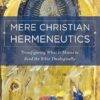Category: Evangelical Calvinist
Writings from the blog: Athanasian Reformed (aka The Evangelical Calvinist). Senior Reformed scholars present a coherent and impassioned articulation of Calvinism for today’s world.
My Final Oxford Essay for My Philo Rel Course: God’s Existence in Cosmic Relief
God’s Existence in Cosmic Relief Is there any need to explain why there is a universe at all? Would God be an explanation? This is the question the rest of this essay will engage with. 1) This essay will reason on the moral need for an explanation of universe’s existence vis-à-vis human teleology. 2) Based on the affirmative of point one this essay will further attempt to reason from the universe’s apparent contingency concerning God’s existence as the best inference to an explanation, regarding the universe’s existence in general, and human existence embedded in the universe in particular. 3) For…
The OT and NT God are One in the Same
It is artificial and anachronistic for people to look back at the economy of God in the Old Testament, and presume that God Himself is subject to our modern ethical sensibilities (whatever those might be). The Old Testament took place in the Ancient Near East (ANE). And God’s dealings with humanity at that time were in those conditions (sitz im leben). Often modern and postmodern people look back at the OT, and its “violence passages,” especially the ones where God commands His covenant people to wipe out whole people groups and nations, and wince. They try to explain it away…
Oxford Trained Philosopher of Religion
I am an a officially trained philosopher of religion at the University of Oxford . Athanasian Reformed
KJV’s Mere Christian Hermeneutics
Just finished. As an after Barth, Torrance, Calvin, Athanasius (and patristic theology), John Webster (on Scripture) person, I would say that Kevin J. Vanhoozer’s book fits well with what us Evangelical Calvinists (after our books and my blog work) call a Dialogical Theology and reading of the text of Scripture. It is more about the encounter, transformation, and instrumentality of the reading of Holy Scripture versus the academic slicing and dicing of things; the latter often being under higher critical antisupranaturalistic pressures. This is not to say that the grammatical historical has no place, but that such a frame is…
Bosom of the Father Knowledge
No one has seen God at any time; the only begotten God who is in the bosom of the Father, He has explained Him. –John 1:18 Jesus has brought all who will, because He first willed for us, into the bosom of the Father in union with Him. It is here, this locale, where knowledge of God alone obtains. It is God’s Self-knowledge that He has invited us into, as if a banqueting table. The Christian, by the grace of God in Christ, shares in the divine nature; indeed, the particular nature of the particular and only living God. Without God’s revelation there would…
Disallowing Secular Unbelief to Dictate the Terms of God
Secular, worldly unbelief. I think Christians often allow the bar to be set much too low. Much of Christian theology, for example, especially those that have taken shape in the natural theology forest, allow the skeptic’s unbelief to dictate the types of questions the theologians seek to answer. Primary of which are observed in Thomas Aquinas’ Prima Pars (first part) of his Summa Theologiae. Here, Thomas seeks to answer the questions of God’s existence, and whether or not it is coherent to believe that God exists (like a generic God; albeit, in Thomas’ context this would be applied to the…
On a Doctoral Degree Program
I have just been accepted into what is called a Doctor of the University in Theology program at Johann Heinrich Pestalozzi Christian University (located in both Vienna, Austria and Miami, Florida). My supervisor for the program is Dr. Craig Paterson (PhD, St. Louis University). It should take about a year to complete. Below I will copy and paste JHPCU’s description of the degree and its requirements. Very excited about this! Doctor of the University by Assessment Degree Requirements The Degree of Doctor of the University (D.Univ.) by Assessment is awarded by the University. D.Univ. candidates are assessed via a process built around prior experiential learning…
‘At any rate, it is not at all clear that He controls dogmatic thinking concerning Himself.’
It is time to break my blogging fast. It is fitting, the topic of this post, because I am nearing the end of my Philosophy of Religion class at the University of Oxford (next week is the last). There is one unit left, it is on Faith, Prayer, and the Spiritual life. The class is largely populated by atheists and agnostics. The text we used for class (which was augmented by many other readings and lectures) was written by an Oxford philosopher named T. J. Mawson, Belief in God. He is a Christian theist, but a panentheist who holds to…
The Early Aristotelianization of Reformed and Lutheran Theology
Barth on the stillbirth of the Protestant Reformation. He underscores a reality that I have been, we have been writing about for years, in regard to the scholasticism Reformed and Lutheran. That is to note, the reception of the Aristotelian mantle that had, ironically, brought to formation the very Church, and her doctrina, that Luther was seeking to reform. Unfortunately, very early on in the second and third generation reformers (on both the Reformed and Lutheran sides) imbibed the theological categories that had originally led to the status of the Roman Church that Luther and others believed needed to be…
God’s Freedom, Goodness and Necessity in Philosophical and Theological Convivium
More thoughts on the properties of God for my philosophy of religion class. As I have been responding, this week, surrounding God’s omniscience, eternality freedom, goodness, and necessity. These are my last three responses. What is freedom? Does it make sense to talk about maximal or perfect freedom? If yes, how should this be defined? If not, why not? Do you agree that the ability to do what is morally wrong is a power for human beings but a liability for God? Answer the question by laying out the argument for this as you understand it, or asking any questions…







